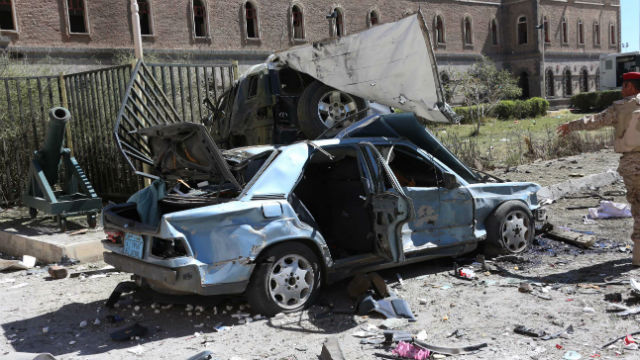SUMMARY
This is AI generated summarization, which may have errors. For context, always refer to the full article.

MANILA, Philippines – The Philippines on Monday, December 9, urged its nationals in Yemen to come home after a suspected terrorist attack killed 7 Filipinos and injured 11 others there.
In a statement, Department of Foreign Affairs (DFA) spokesman Raul Hernandez said the Philippines will shoulder the repatriation costs of Filipinos “who wish to come home,” after it raised crisis alert level 3 over the Middle Eastern country.
Crisis alert level 3 entails voluntary repatriation. The DFA raises this alert level “when violent disturbances or external aggression occur in a limited area.”
Hernandez also said the Department of Labor and Employment will impose a total deployment ban on Yemen. He added the government advises Filipinos “to defer travel to Yemen regardless of purpose.”
The Philippines raised the alert level after 7 Filipinos, including a doctor, died in an attack on Yemen’s defense ministry last week. (READ: 7 Filipinos dead in Yemen attack.)
The government has informed the fatalities’ next of kin about their death.
Up to 2,190 Filipinos live in Yemen, according to the latest government estimate.
Political unrest
The Philippines has placed Yemen under crisis alert level 1 since 2012.
Hernandez earlier said the government declares this alert level “when there is internal disturbance in a country.” Under this alert level, the government advises Filipinos “to take necessary precautions.”
The brazen attack on the complex follows a spate of hit-and-run strikes on military personnel and officials, as the country struggles to complete a thorny political transition.
The attacks in the capital and in the country’s south have been blamed on Al-Qaeda in the Arabian Peninsula (AQAP), which Washington regards as the jihadist network’s most dangerous branch.
Yemen has been going through a difficult political transition since veteran president Ali Abdullah Saleh was ousted in February 2012 after a year of deadly protests against his 33-year rule.
The transition aims to culminate in a new constitution and pave the way for parliamentary and presidential elections slated for February 2014, but it still faces many hurdles. – with reports from Agence France-Presse/Rappler.com
Add a comment
How does this make you feel?
There are no comments yet. Add your comment to start the conversation.